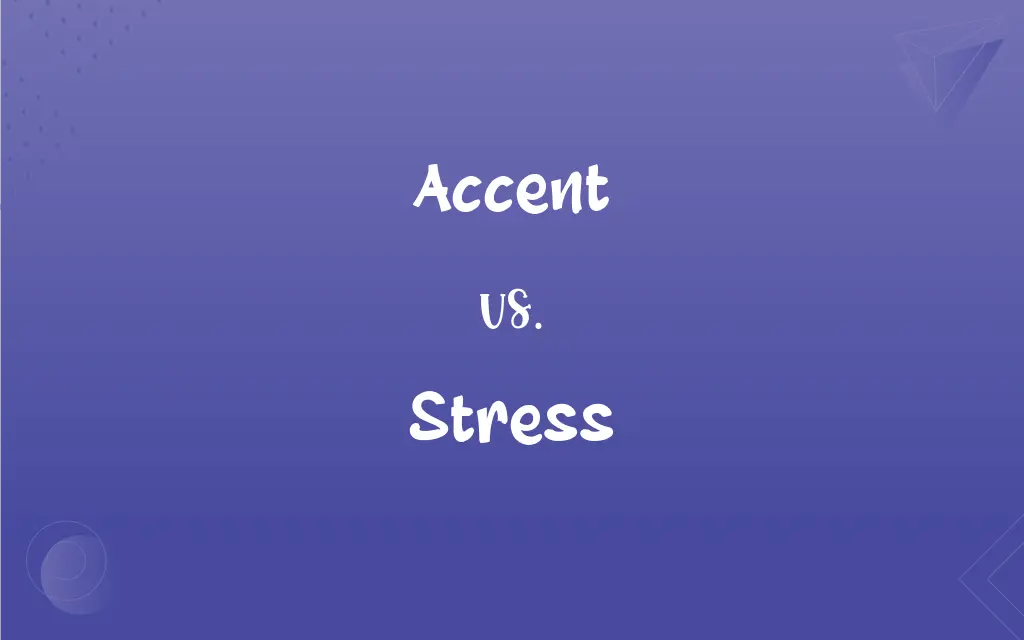Accent vs. Stress: What's the Difference?
By Harlon Moss & Janet White || Updated on May 20, 2024
Accent refers to the distinctive way of pronouncing words characteristic of a particular region or group, while stress refers to the emphasis placed on specific syllables within words or on words within sentences.

Key Differences
Accent is the characteristic way of pronouncing words that indicates a person's regional or social background. It includes variations in pronunciation, intonation, and sometimes even vocabulary. Stress, on the other hand, refers to the emphasis placed on certain syllables within words or on specific words within sentences. This emphasis can change the meaning of words or sentences.
Accents are more about how groups of people speak differently based on geographical or social factors, whereas stress focuses on how emphasis is applied in language to affect meaning and pronunciation within a particular dialect or language.
In linguistics, understanding both accent and stress is essential for grasping the nuances of spoken language. Accents help identify and distinguish between different speakers' backgrounds, while stress patterns are crucial for proper pronunciation and comprehension in both native and second-language learning.
Comparison Chart
Definition
Pronunciation characteristic of a region or group
Emphasis on specific syllables or words
Focus
Pronunciation, intonation, and sometimes vocabulary
Emphasis and intonation within words or sentences
ADVERTISEMENT
Examples
British accent, Southern American accent
RE-cord (noun) vs. re-CORD (verb)
Role
Identifies regional or social background
Affects meaning and clarity of speech
Linguistic Level
Regional or social phonetic patterns
Syllabic or word-level emphasis
Accent and Stress Definitions
Accent
(linguistics) A higher-pitched or stronger (louder or longer) articulation of a particular syllable of a word or phrase in order to distinguish it from the others or to emphasize it.
In the word "careful", the accent is placed on the first syllable.
Stress
The emphasis placed on specific syllables within words.
In the word 'dessert,' the stress is on the second syllable.
ADVERTISEMENT
Accent
Identifies a speaker’s regional or social background.
You can tell he's from New York by his accent.
Stress
Affects the rhythm and intonation of speech.
Proper stress is important for natural-sounding speech.
Accent
Often learned and developed during childhood.
Children often adopt the accent of their environment.
Stress
Essential for proper pronunciation and understanding in language.
Learning the stress patterns of English can be challenging for learners.
Accent
The relative prominence of a particular syllable of a word by greater intensity or by variation or modulation of pitch or tone.
Stress
Importance, significance, or emphasis placed on something.
Accent
Vocal prominence or emphasis given to a particular syllable, word, or phrase.
Stress
The relative force with which a sound or syllable is spoken.
Accent
One determined by the regional or social background of the speaker.
Stress
The emphasis placed on the sound or syllable spoken most forcefully in a word or phrase.
Accent
One determined by the phonetic characteristics of the speaker's native language carried over to that speaker's use of another language.
Stress
The relative force of sound or emphasis given a syllable or word in accordance with a metrical pattern.
Accent
A mark or symbol used in the printing and writing of certain languages to indicate the vocal quality to be given to a particular letter
An acute accent.
Stress
A syllable having strong relative emphasis in a metrical pattern.
Accent
A mark or symbol used in printing and writing to indicate the stressed syllables of a spoken word.
Stress
An accent or mark representing such emphasis or force.
Accent
Rhythmically significant stress in a line of verse.
Stress
The internal distribution of force per unit area within a body subject to an applied force or system of forces.
Accent
Emphasis or prominence given to a note or chord, as by an increase in volume or extended duration.
Stress
The internal resistance of a body to such an applied force or system of forces.
Accent
A mark representing this.
Stress
A condition of extreme difficulty, pressure, or strain
"He presided over the economy during the period of its greatest stress and danger" (Robert J. Samuelson).
Accent
A mark used as a superscript to distinguish among variables represented by the same symbol.
Stress
A condition of physiological or psychological disturbance to the normal functioning or well-being of an organism, occurring as a response to any of various environmental or psychosocial stimuli. Signs and symptoms of stress in humans include increased blood pressure, insomnia, and irritability.
Accent
A mark used as a superscript to indicate the first derivative of a variable.
Stress
A stimulus or circumstance causing such a condition
Couldn't stand the stresses of the job and quit.
Accent
A mark or one of several marks used as a superscript to indicate a unit, such as feet (′) and inches (") in linear measurement.
Stress
To place emphasis on
Stressed basic fire safety in her talk.
Accent
A distinctive feature or quality, such as a feature that accentuates, contrasts with, or complements a decorative style.
Stress
To give prominence of sound to (a syllable or word) in pronouncing or in accordance with a metrical pattern.
Accent
Something that accentuates or contrasts something else, as a touch of color that makes the features of an image stand out.
Stress
(Informal) To subject to physiological or mental stress or strain. Often used with out
The pressure of the deadline is really stressing me out.
Accent
Particular importance or interest; emphasis
The accent is on comfort.
Stress
To subject to mechanical pressure or force.
Accent
To stress or emphasize the pronunciation of
Accented the first syllable in “debacle.”.
Stress
To undergo physiological or mental stress, as from working too much. Often used with out.
Accent
To mark with a printed accent.
Stress
(biology) A physical, chemical, infective agent aggressing an organism.
Accent
To focus attention on; accentuate
A program that accents leadership development.
Stress
(biology) Aggression toward an organism resulting in a response in an attempt to restore previous conditions.
Accent
(figuratively) Emphasis or importance in general.
At this hotel, the accent is on luxury.
Stress
The internal distribution of force across a small boundary per unit area of that boundary (pressure) within a body. It causes strain or deformation and is typically symbolised by σ or τ.
Accent
(orthography) A mark or character used in writing, in order to indicate the place of the spoken accent, or to indicate the nature or quality of the vowel marked.
The name Cézanne is written with an acute accent.
Stress
Force externally applied to a body which cause internal stress within the body.
Accent
Modulation of the voice in speaking; the manner of speaking or pronouncing; a peculiar or characteristic modification of the voice, expressing emotion; tone.
Stress
(uncountable) Emotional pressure suffered by a human being or other animal.
Go easy on him, he's been under a lot of stress lately.
Accent
The distinctive manner of pronouncing a language associated with a particular region, social group, etc., whether of a native speaker or a foreign speaker; the phonetic and phonological aspects of a dialect.
A foreign accent
A broad Irish accent
A hint of a German accent
Stress
A suprasegmental feature of a language having additional attention raised to a sound, word or word group by means of of loudness, duration or pitch; phonological prominence.
Some people put the stress on the first syllable of “controversy”; others put it on the second.
Accent
A manner of pronunciation suggesting that the speaker is from a different region; a foreign accent.
My professor's accent is so thick that it's difficult to understand her lectures.
She spoke with a strong accent that betrayed her southern roots.
I was surprised to learn that he was an immigrant, as he spoke without any accent.
Stress
The suprasegmental feature of a language having additional attention raised to a sound by means of of loudness and/or duration; phonological prominence phonetically achieved by means of dynamics as distinct from pitch.
Accent
(sign languages) A distinctive manner of producing a sign language, such as someone who does not normally use a certain sign language might have when using it.
Stress
(uncountable) Emphasis placed on a particular point in an argument or discussion (whether spoken or written).
Accent
A word; a significant tone or sound.
Stress
Obsolete form of distress
Accent
Expressions in general; speech.
Stress
Distress; the act of distraining; also, the thing distrained.
Accent
Stress laid on certain syllables of a verse.
Stress
(transitive) To apply force to (a body or structure) causing strain.
Accent
(music) A regularly recurring stress upon the tone to mark the beginning, and, more feebly, the third part of the measure.
Stress
(transitive) To apply emotional pressure to (a person or animal).
Accent
(music) A special emphasis of a tone, even in the weaker part of the measure.
Stress
To suffer stress; to worry or be agitated.
Accent
(music) A mark used to represent this special emphasis.The third and fourth symbols are accents (marks used to represent special emphasis in music).
Stress
(transitive) To emphasise (a syllable of a word).
“Emphasis” is stressed on the first syllable, but “emphatic” is stressed on the second.
Accent
(music) The rhythmical accent, which marks phrases and sections of a period.
Stress
(transitive) To emphasise (words in speaking).
Accent
(mathematics) A prime symbol.
Stress
(transitive) To emphasise (a point) in an argument or discussion.
I must stress that this information is given in strict confidence.
Accent
Emphasis laid on a part of an artistic design or composition; an emphasized detail, in particular a detail in sharp contrast to its surroundings.
Accent color
Stress
Distress.
Sad hersal of his heavy stress.
Accent
A very small gemstone set into a piece of jewellery.
Stress
Pressure, strain; - used chiefly of immaterial things; except in mechanics; hence, urgency; importance; weight; significance.
The faculties of the mind are improved by exercise, yet they must not be put to a stress beyond their strength.
A body may as well lay too little as too much stress upon a dream.
Accent
(archaic) Utterance.
Stress
The force, or combination of forces, which produces a strain; force exerted in any direction or manner between contiguous bodies, or parts of bodies, and taking specific names according to its direction, or mode of action, as thrust or pressure, pull or tension, shear or tangential stress.
Stress is the mutual action between portions of matter.
Accent
(transitive) To express the accent of vocally; to utter with accent.
Stress
Force of utterance expended upon words or syllables. Stress is in English the chief element in accent and is one of the most important in emphasis. See Guide to pronunciation, 31-35.
Accent
(transitive) To mark emphatically; to emphasize; to accentuate; to make prominent.
Stress
Distress; the act of distraining; also, the thing distrained.
Accent
(transitive) To mark with written accents.
Stress
To press; to urge; to distress; to put to difficulties.
Accent
A superior force of voice or of articulative effort upon some particular syllable of a word or a phrase, distinguishing it from the others.
Stress
To subject to stress, pressure, or strain.
Accent
A mark or character used in writing, and serving to regulate the pronunciation; esp.: (a) a mark to indicate the nature and place of the spoken accent; (b) a mark to indicate the quality of sound of the vowel marked; as, the French accents.
Stress
To subject to phonetic stress; to accent.
Accent
Modulation of the voice in speaking; manner of speaking or pronouncing; peculiar or characteristic modification of the voice; tone; as, a foreign accent; a French or a German accent.
The tender accent of a woman's cry.
Stress
To place emphasis on; to make emphatic; emphasize.
Accent
A word; a significant tone
Winds! on your wings to Heaven her accents bear,Such words as Heaven alone is fit to hear.
Stress
The relative prominence of a syllable or musical note (especially with regard to stress or pitch);
He put the stress on the wrong syllable
Accent
Stress laid on certain syllables of a verse.
Stress
(psychology) a state of mental or emotional strain or suspense;
He suffered from fatigue and emotional tension
Stress is a vasoconstrictor
Accent
A regularly recurring stress upon the tone to mark the beginning, and, more feebly, the third part of the measure.
Stress
(physics) force that produces strain on a physical body;
The intensity of stress is expressed in units of force divided by units of area
Accent
A mark placed at the right hand of a letter, and a little above it, to distinguish magnitudes of a similar kind expressed by the same letter, but differing in value, as y´, y.
Stress
Special emphasis attached to something;
The stress was more on accuracy than on speed
Accent
To express the accent of (either by the voice or by a mark); to utter or to mark with accent.
Stress
Difficulty that causes worry or emotional tension;
She endured the stresses and strains of life
He presided over the economy during the period of the greatest stress and danger
Accent
To mark emphatically; to emphasize.
Stress
To stress, single out as important;
Dr. Jones emphasizes exercise in addition to a change in diet
Accent
Distinctive manner of oral expression;
He couldn't suppress his contemptuous accent
She had a very clear speech pattern
Stress
Put stress on; utter with an accent;
In Farsi, you accent the last syllable of each word
Accent
Special importance or significance;
The red light gave the central figure increased emphasis
The room was decorated in shades of gray with distinctive red accents
Stress
Test the limits of;
You are trying my patience!
Accent
The usage or vocabulary that is characteristic of a specific group of people;
The immigrants spoke an odd dialect of English
He has a strong German accent
Stress
The emphasis placed on specific words within sentences.
In 'I didn't say he stole the money,' stressing different words changes the meaning.
Accent
The relative prominence of a syllable or musical note (especially with regard to stress or pitch);
He put the stress on the wrong syllable
Stress
Can change the meaning of a word or sentence.
The noun 'record' and the verb 'record' are distinguished by stress.
Accent
A diacritical mark used to indicate stress or placed above a vowel to indicate a special pronunciation
Accent
To stress, single out as important;
Dr. Jones emphasizes exercise in addition to a change in diet
Accent
Put stress on; utter with an accent;
In Farsi, you accent the last syllable of each word
Accent
The distinctive way of pronouncing words characteristic of a particular region or group.
She spoke with a charming French accent.
Accent
Variations in pronunciation and intonation.
His Australian accent made his speech unique.
Accent
Can include differences in vocabulary and grammar.
Different accents can sometimes lead to misunderstandings.
FAQs
What is an accent?
An accent is the distinctive way of pronouncing words that indicates a person’s regional or social background.
Is accent related to regional differences?
Yes, accents are often related to regional or social differences in pronunciation.
Can someone have multiple accents?
Yes, individuals can have multiple accents, often depending on their exposure to different languages or regions.
Can accents change over time?
Yes, accents can change due to factors like relocation, age, or exposure to different linguistic environments.
What is stress in language?
Stress is the emphasis placed on certain syllables within words or on specific words within sentences.
Can stress be marked in written language?
Stress is not typically marked in standard writing but can be indicated using diacritics or italics for emphasis.
Can stress change the meaning of words?
Yes, stress can change the meaning of words, such as in 'record' (RE-cord, noun) vs. 'record' (re-CORD, verb).
Do accents affect word stress?
Accents can influence the stress patterns of words, but stress rules vary by language.
How does stress affect sentence meaning?
Stress affects sentence meaning by emphasizing different words, altering the implied message.
Can accent affect intelligibility?
Yes, strong accents can sometimes make speech harder to understand for those not familiar with them.
Are accents influenced by native language?
Yes, a person’s native language can influence their accent when speaking another language.
Is stress important in all languages?
Yes, stress is important in most languages, though the rules and significance of stress can vary.
Do all languages have word stress?
Most languages have some form of word stress, but the patterns and rules can differ greatly.
Can accents be learned or modified?
Yes, accents can be learned or modified through practice and exposure.
Can stress patterns be predictable?
In many languages, stress patterns follow predictable rules, but there can be exceptions.
Can technology detect accents?
Yes, advanced speech recognition technology can often detect and analyze accents.
How does stress influence intonation?
Stress influences intonation by affecting the pitch and rhythm of spoken language.
Does stress impact language learning?
Yes, understanding stress patterns is crucial for accurate pronunciation and comprehension in language learning.
Is stress placement the same in all English dialects?
Stress placement can vary slightly between different English dialects.
Why is stress important in pronunciation?
Stress is important because it helps convey the correct meaning and natural rhythm of speech.
About Author
Written by
Harlon MossHarlon is a seasoned quality moderator and accomplished content writer for Difference Wiki. An alumnus of the prestigious University of California, he earned his degree in Computer Science. Leveraging his academic background, Harlon brings a meticulous and informed perspective to his work, ensuring content accuracy and excellence.
Co-written by
Janet WhiteJanet White has been an esteemed writer and blogger for Difference Wiki. Holding a Master's degree in Science and Medical Journalism from the prestigious Boston University, she has consistently demonstrated her expertise and passion for her field. When she's not immersed in her work, Janet relishes her time exercising, delving into a good book, and cherishing moments with friends and family.































































